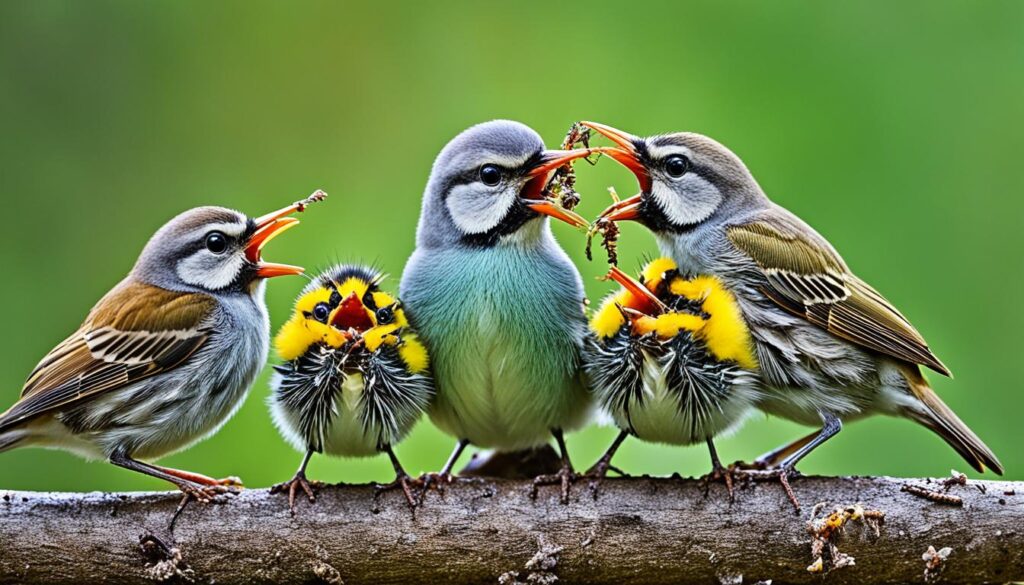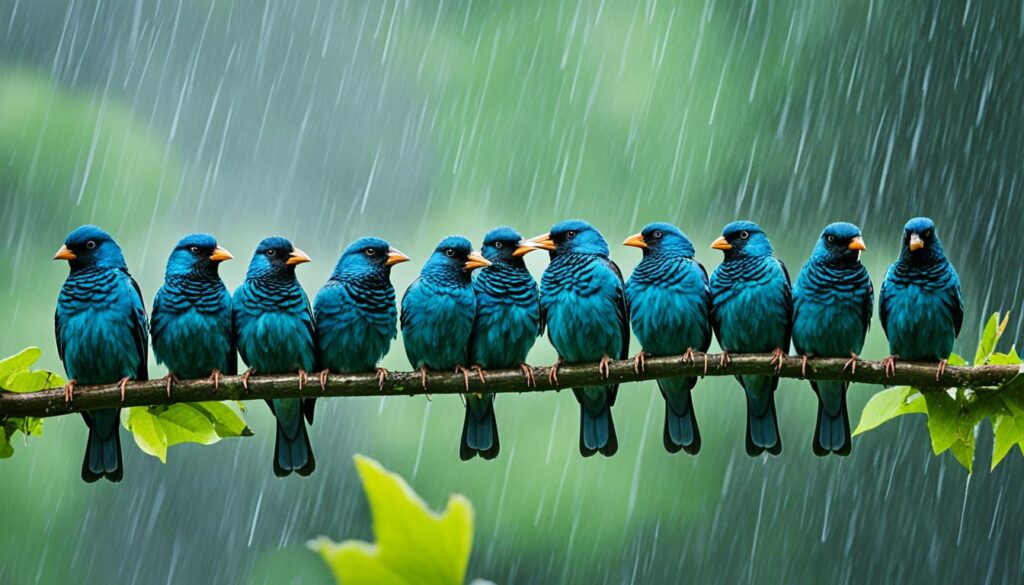It is vital to make sure baby birds get the right food. Their dietary needs change as they grow. For the first days, they could need to be fed every 2-3 hours for 12 to 14 hours. They should be fed bugs, which helps them get the protein they need. Feeding them isn’t something most people can do. Without the right food or equipment, it’s tough. If you’re not a bird expert with a special license, don’t try feeding a baby bird.
Also, the mother might be close by, watching over her chick. Your presence could scare her away. Only move a baby bird if it’s hurt or definitely abandoned.
Key Takeaways
- Baby birds have specific dietary needs that vary by age and species.
- They may need to eat every 2-3 hours for up to 14 hours a day to get enough protein.
- Feeding baby birds requires specialized knowledge and equipment, and should only be done by experts.
- Touching or removing a baby bird should only be done if it is injured or abandoned.
- Providing the appropriate food and care is crucial for the survival and development of baby birds.
Introduction: Do Baby Birds Really Need to Be Fed?
When you see a baby bird that seems hungry, stay calm. Watch for its parents for an hour. They might come back to feed it. The baby probably wasn’t left alone, and its parents are likely near.
Just remember, a mother bird can feed her chicks quickly. She might be looking after a few chicks in different spots. So, parents’ visits might seem irregular. Watch closely, or you could miss the feeding times.
Signs That a Baby Bird Needs Intervention
If a baby bird starts looking weak and hasn’t eaten in a while, it may need help. If it looks hurt or abandoned, call your local wildlife experts. They know how to feed and care for bird properly.
Risks of Intervening Without Proper Knowledge
Feeding baby birds the wrong way can be dangerous. Each bird type needs specific food to survive. Giving the wrong food can even cause the bird to die. Understanding their diet is key.
Trying to feed a baby bird by hand can go wrong if you’re not trained. Using the wrong food amount or temperature can hurt the bird. Let experts at wildlife centers take care of orphaned or hurt baby birds.
What to Feed Baby Birds: Recommended Foods
Finding a baby bird can be tricky, as they all have different needs. Whether it’s a freshly fallen fledgling or a bird you’re raising from a hatchling, right foods are vital. Providing the right nourishment is key for their growth and survival.
High-Protein Foods for Carnivorous Birds
Birds like hawks, owls, and falcons need a lot of protein. Small bits of chicken or fish are perfect for them. Insects such as caterpillars, ants, and yellow mealworms are also great choices because they are high in protein. These help them grow quickly.
Fruits and Vegetables for Omnivorous Birds
Songbirds and pigeons eat both meat and plants. They do well with a mix of foods. Soft fruits like berries and melons give them sugars and vitamins. Adding partially digested seeds from adult birds helps feed those that mainly eat seeds.
| Food Type | Recommended for | Nutritional Benefits |
|---|---|---|
| Lean Meat (Chicken, Fish) | Carnivorous Birds | High Protein |
| Insects (Caterpillars, Ants, Mealworms) | Carnivorous Birds | High Protein |
| Soft, Ripe Fruits (Berries, Melons) | Omnivorous Birds | Sugars, Vitamins, Minerals |
| Partially Digested Seeds | Grain-Eating Birds | Balanced Nutrients |
Humans should avoid giving baby birds human foods, milk, and bread. These can hurt them. Always get advice from wildlife experts if you’re not sure what to feed a baby bird.
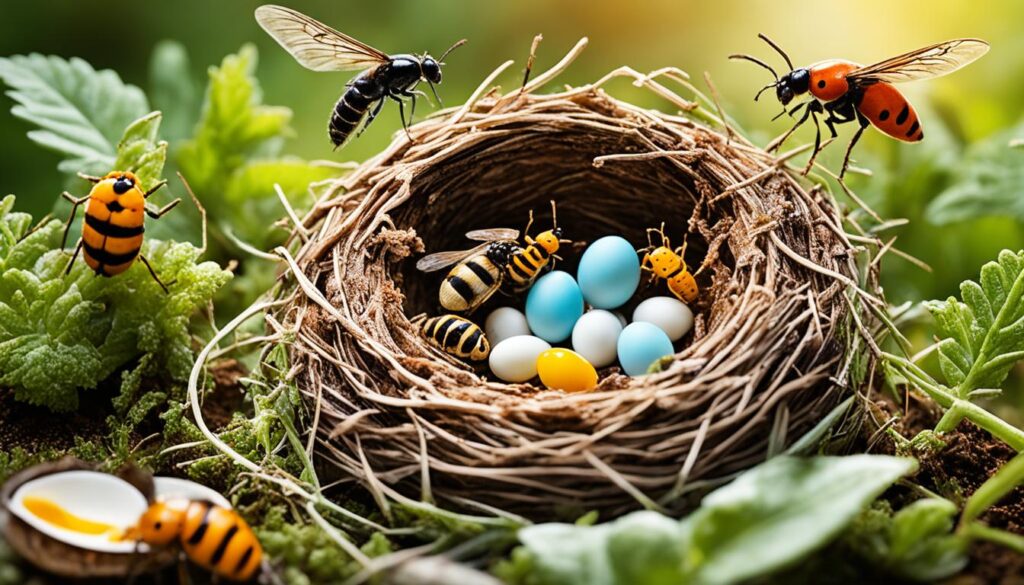
What Not to Feed Baby Birds
When taking care of baby birds, it’s important to watch out for harmful or unsuitable foods. Avoid feeding them human foods like bread, potato chips, and honey. Also, don’t give them milk, raw meat, or spoiled seeds.
These foods lack the right nutrition for young birds. They often contain things like flavors and spices that can hurt a bird’s health. The textures and types of human food can also cause problems for the chicks’ digestion.
| Foods to Avoid for Baby Birds | Reasons |
|---|---|
| Bread | Provides little nutritional value and can cause crop impaction |
| Potato chips | High in fat and salt, which can be harmful to baby birds |
| Biscuits | Contain ingredients that are difficult for baby birds to digest |
| Honey | Can contain botulism spores that are dangerous for young birds |
| Milk | Lactose-intolerant and can cause digestive issues |
| Raw meat | Carries the risk of bacterial contamination and parasites |
| Spoiled seeds | Can be moldy and contain toxins that are harmful to baby birds |
Stick to foods that baby birds would find in the wild. A diet of high-protein foods, and fruits is best for their health. This diet helps them grow strong and healthy.
“Feeding baby birds well is key to their health. Avoid harmful human foods to protect these young, fragile creatures.”
How to Feed Baby Birds: Practical Tips
Feeding baby birds is rewarding but needs care. It’s key to feed them right for their health and growth. Learn how to feed them safely from food prep to setting up a feeding plan.
Preparing the Food Properly
It’s essential to offer baby birds the correct food. Soft and at room temperature is best to avoid harm. Make sure all dry meals are moist before feeding to babies.
Don’t give them food that’s too hot or too cold. And, cut or crush food to fit their small beaks. For insects, they should be tiny for easy eating.
Feeding Techniques and Schedules
- Touch the bird as little as possible to minimize stress and the risk of injury.
- Never force the bird’s beak open to feed it, as this can cause trauma.
- Wash your hands before and after handling baby birds or their food to prevent the spread of disease.
- Newly hatched chicks (hatchlings without feathers) require a feeding temperature of 95°F-97°F (35°C-36°C).
- Chicks with new feathers (pinfeathers) should be kept at a temperature of 75°F-85°F (24°C-30°C).
- Fully feathered and weaned chicks can be kept at room temperature.
- Day-old chicks need a more dilute food mixture, with 90% water, while older chicks should have a 70%-75% liquid mixture.
- Chicks less than one week old should be fed 6–10 times per day (every 2-3 hours).
- Chicks that have not opened their eyes may require 5–6 feedings per day (every 3-4 hours) during the first week of life.
Keep an eye on the baby birds and tweak their diet and feeding times as needed. If a chick won’t put on weight, talk to a bird doctor.
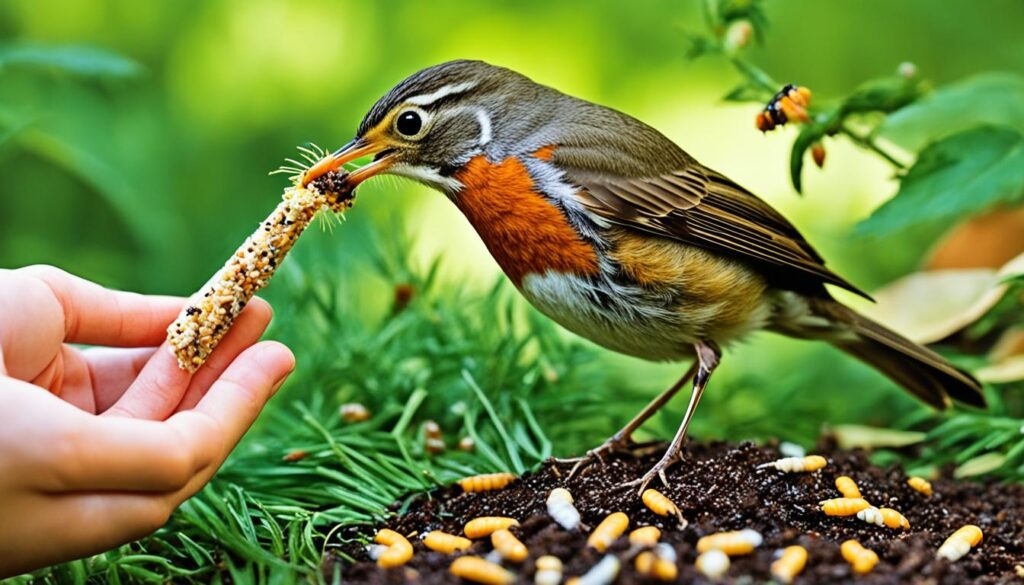
“Feeding baby birds requires patience, attention to detail, and a deep understanding of their unique dietary needs. With the right approach, you can provide the nourishment they need to thrive.”
Baby Bird Care: Creating a Suitable Environment
A proper habitat is key for baby birds to grow well and stay healthy. It’s important to think about the right temperature, humidity, and other needs. These things make the baby birds feel like they are still in their natural nest in the wild.
Brooder Setup and Temperature Control
Keeping the right temperature and humidity is very important for baby birds. When they’re newborns, they need a warm, humid environment. This means they should be in a place that is between 95°F-97°F (35°C-36°C). As they grow and get feathers, they can handle a bit cooler and less humid places.
Baby birds need special places to live, like brooders, incubators, or even just storage containers. You should always have thermometers and humidity checkers in their home. This lets you keep close watch on the conditions. It’s also good to put soft, disposable bedding in the bottom of their house. Things like paper towels or hand towels work. This keeps the baby birds safe and their home clean.
| Age | Temperature Range | Humidity Range |
|---|---|---|
| 0-1 week | 95°F-97°F (35°C-36°C) | Greater than 50% |
| 1 week+ | 85°F-90°F (29°C-32°C) | 40-50% |
It’s really important to watch the baby birds’ home carefully. You might need to change things like the temperature and humidity. This ensures that they have the right conditions to survive and grow up healthy.
“Birds given incorrect care can suffer defects in behavior, growth abnormalities, and even death.”
This article stresses how crucial it is to get the baby bird’s living space just right. Small mistakes in the temperature and humidity can be very harmful. By creating a place that’s safe, warm, and controlled, we give these little ones the best beginning in life.
Hand-Rearing Baby Birds: A Comprehensive Guide
Raising baby birds by hand is both a delicate and demanding job. It is usually done when parent birds can’t look after their young. This task needs a lot of your time, patience, and knowledge. It’s a serious responsibility.
Baby birds raised by hand often form strong bonds with people. This makes them great as pets. But, it also means they depend entirely on their human caretakers for everything.
Choosing the Right Hand-Feeding Formula
Choosing the right formula is vital for a baby bird’s health. You can find hand-feeding formulas like Zupreem Embrace and Kaytee Exact. It’s important to make sure the formula is warm, not hot. It should be about the same temperature as a baby’s bottle.
The texture of the formula changes with the bird’s age. Very young birds need a thin mixture. Older ones eat a thicker mix, similar to applesauce. How much you feed them also depends on their species. For example, Lovebirds need 8-10 cc of food, while Cockatoos might need 60-110 cc.
Feeding Techniques and Schedules
Feeding baby birds the right way, at the right times, is key to their health. When they’re young, they may need to eat every 6-8 hours. As they grow, the feeding schedule changes. They eat less often but more food each time.
Mixing the formula well and ensuring the right temperature is essential. Clean feeding tools prevent sickness in the birds.
Environmental Considerations
The setting where you keep baby birds is as important as their food. Baby birds need a warm place, around 85-88 degrees Fahrenheit. As they grow feathers, they need room temperature.
It’s not good to put baby birds that can’t fly in normal cages. They can’t move well or stay safe. So, use soft materials like chick starter for them to rest on.
Hand-rearing baby birds is not easy. It’s for those with experience or who work with bird experts. By ensuring a good diet, a proper home, and observing their health, you can give these tiny birds a great start in life.
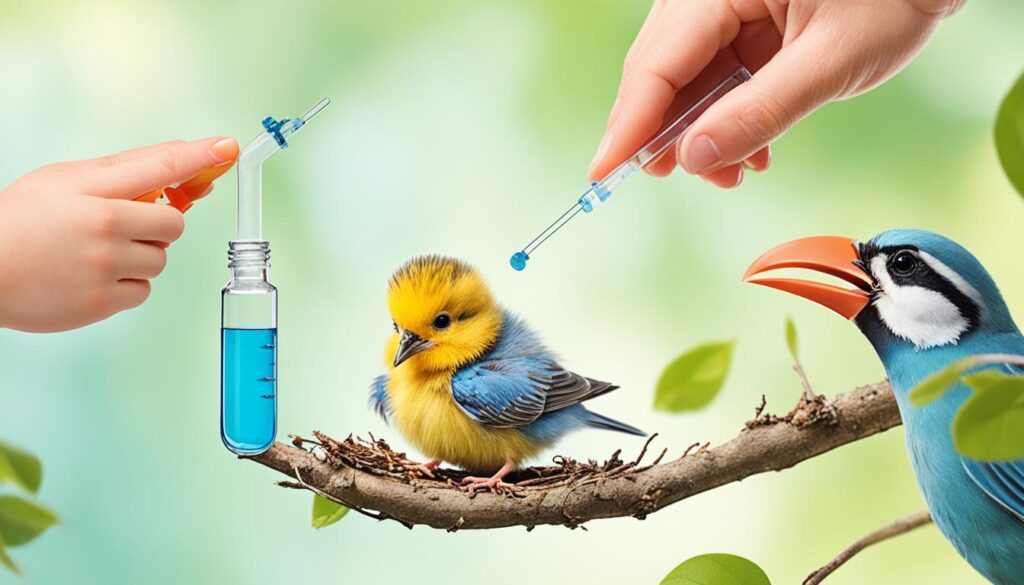
| Bird Species | Feeding Amount (cc) | Weaning Age (weeks) |
|---|---|---|
| Lovebirds | 8-10 | 8 |
| Cockatiels | 10-12 | 9-10 |
| Small Conures | 10-15 | 10-11 |
| Medium Conures or Parrots | 20-30 | 10-11 |
| Larger Parrots | 40-50 | 10-11 |
| Large Cockatoos and Macaws | 60-110 | 10-11 |
“Hand-rearing baby birds is a huge responsibility and requires time, patience, and commitment. Hand-fed baby birds are entirely reliant on you for everything.”
what can baby birds eat: Addressing Dietary Needs
The food baby birds need varies a lot depending on the kind of bird they are. While grown-up birds in backyards can do well with seeds and leftovers, such food is not ok for baby birds’ stomachs. If a baby bird is a meat-eater, it needs lots of protein to grow fast. On the other hand, birds that eat both plants and meat can start eating soft fruits little by little.
Some baby birds can eat special baby feed made just for them. This food is packed with good things for them. Using these feeds can make sure your baby bird is getting all they need. But, it’s key to look up what your bird type eats to give the right nutrition.
All baby birds need different foods than adults do. They have to eat every 15-20 minutes from sunrise to sunset in their first weeks. They should have a meal full of proteins, fats, and other stuff they need. The right way to feed them and keeping them cosy and secure are vital for their well-being.
“Approximately 80-90% of bird diseases are due to poor diets. This hits home how important giving the right food to baby birds is.”
Recommended Foods for Different Baby Bird Species
- Carnivorous Birds: These birds need high-protein foods. Insects, worms, and special baby bird food are a must for them.
- Omnivorous Birds: Besides the protein-rich foods, veggies and fruits are good for these birds.
It’s very important to keep bad foods away from baby birds. Things like bread, milk, salt, and avocado can harm them. Knowing what each baby bird type needs to eat will help them grow up strong and healthy.
Signs of Trouble: When to Seek Professional Help
If you love and care for birds, watching for any signs of trouble is key. It could be a make or break for their health and survival. Knowing the signs of illness in baby birds is vital. As is understanding when to take a baby bird to a rehabilitation center and spotting problems in hand-reared baby birds.
Look out for these signs that your baby bird needs help:
- Constant chirping or crying
- Excessive fussiness and lack of sleep
- Listlessness or lack of energy
- Refusal to accept food
- Slow or stagnant crop emptying
- Lack of weight gain or slow growth
- Abnormal posturing or wing and/or leg positions
- Unusual droppings or absence of droppings
- Wetness or food residue on the skin over the crop (indicating a potential crop burn)
These signs could mean many different health or care issues. Take them seriously. Skipping action could make the situation worse, possibly leading to the baby bird’s death.
“The sooner a sick or injured baby bird gets help, the more likely they are to get better and go back to the wild.”
When you see any warning signs, contact a bird doctor or a wildlife rehab center right away. These experts can figure out what’s wrong and help the bird get well. They’re the best chance for the bird to heal and go back to nature.
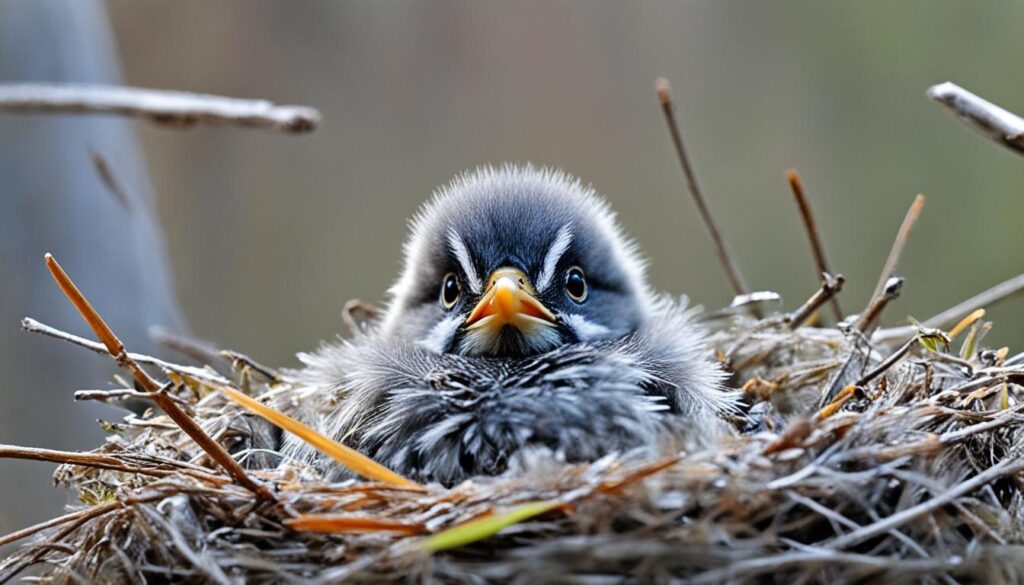
Weaning Baby Birds: Transitioning to Solid Foods
Weaning a baby bird from hand-feeding to solid foods needs patience. The process is crucial for the bird’s growth. It starts with the baby bird growing full feathers, a sign of readiness.
The bird can be given a variety of foods when they start refusing some feedings. This mix includes pelleted diets, fresh fruits, and veggies. Such variety helps baby birds explore new tastes.
When the bird starts eating pellets or veggies on its own, the caretaker can skip some hand-feedings. First, they might skip the mid-day feeding. Later, they can reduce morning and evening feedings too.
During this shift, monitoring the bird’s weight is key. A small weight loss is normal, but big drops are not. If the bird loses a lot of weight fast, it might need help.
Every bird has its own weaning pace. Smaller birds may wean quickly, while larger ones might take over a year. All birds benefit from a consistent and varied food schedule.
By encouraging weaning baby birds and transitioning to solid foods, caretakers help their pets grow healthy and independent. A balanced diet and weaning efforts promote well-being.
| Weaning Milestones | Timeline |
|---|---|
| Baby bird starts pecking at solid food | Indicates readiness to wean |
| Losing 15-20% of body weight | Normal during weaning process |
| Rejecting formula feedings | Sign of preferring solid food |
| Eliminating daytime formula feedings | Transition to solid food intake |
| Introducing water dish | Necessary as bird reduces formula intake |
“Weaning is a gradual process without a set timetable, often varying among individual baby birds and species.”
Watching the baby bird’s diet and weight is essential. It guides the caretaker in the weaning journey, helping the bird learn to eat independently.
Hygiene and Disinfection: Keeping Baby Birds Healthy
Maintaining clean spaces and using good disinfection methods are key when looking after baby birds. These young ones are prone to infections because their immune systems are still growing. It’s very important to keep their environment clean by regularly disinfecting their living area.
It’s vital to clean and disinfect feeding tools before each use. It’s best to use one set of tools for each bird to stop the spread of germs. Make sure to clean, disinfect, and dry these items completely to keep the baby birds healthy.
Disinfecting Baby Bird Enclosures
The place where baby birds live, their brooder, should be disinfected often. We need to kill any germs that could make the birds sick. To do this, wipe down the area with a diluted bleach mix or a pet-friendly disinfectant. Afterward, rinse and dry the brooder well to remove any leftover chemicals that could hurt the birds.
Cleaning Baby Bird Feeding Utensils
It is crucial to keep feeding items clean. Bowls, syringes, and other tools should be scrubbed with hot water and soap, then disinfected. It’s best to have a different set of tools for each bird to avoid spreading germs.
Maintaining Personal Hygiene
If you’re caring for baby birds, it’s also important to keep yourself clean. This means washing your hands before and after handling them. If you’re not feeling well, or you have any cuts, stay away from the birds to keep them safe.
Following these hygiene for baby birds practices helps create a healthy space. This ensures the baby birds have the best chance to grow and thrive.
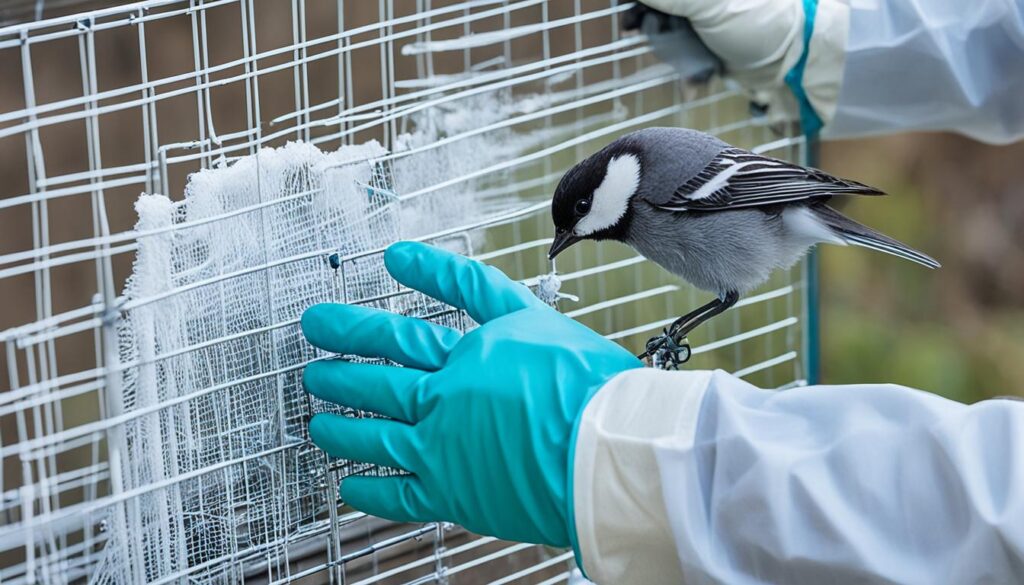
“Proper hygiene and disinfection are the foundation of keeping baby birds healthy and thriving.”
Conclusion
Taking care of baby birds involves understanding what they need to eat, how to feed them the right way, and making sure they grow in a safe place. By using the advice in this guide, we can keep these young birds healthy. If you find a baby bird that needs help, it’s smart to reach out to a wildlife expert for assistance.
It is important to clean carefully when feeding baby birds. You should change how much and how often you feed them, depending on their age. Make sure they are warm enough and give them food made for their specific type of bird. Keep an eye out for any signs of trouble and get help from a pro if you see any.
Following this guide can really change the lives of baby birds for the better. Your care will help them become strong and independent. Remember, the love and effort you put in will stay with these birds, even as they return to the wild.
FAQ
What can baby birds eat?
Good foods for baby birds are small insects, cooked eggs, protein supplements, and soft fruits. There’s also baby bird feed made especially for them. It has the right nutrients for their growth.
How often do baby birds need to be fed?
Baby birds need to eat often, about 12 to 14 hours a day. They have fast metabolisms. The mother bird usually keeps an eye on them from nearby. So, it’s best not to step in unless you’re sure they need help.
What foods should not be fed to baby birds?
There are foods baby birds shouldn’t eat. This includes bread, potato chips, and honey. Such items can be harmful to them. Stick to foods especially made for birds, to keep them healthy.
How should baby birds be fed?
Feeding baby birds requires care. Use soft, not soggy, food to avoid accidents. Soften dry foods with water. Make sure everything is at the right temperature. And try not to touch them too much to keep them calm.
What environmental requirements do baby birds have?
Hatchlings need warmth, about 95°F-97°F. They also need plenty of humidity. As they grow feather, they can handle cooler temperatures. A good brooding setup is essential for keeping them healthy.
When should I seek professional help for a baby bird?
If you find a baby bird not doing well, get help. This includes if they seem hurt, very tired, or not eating. Wildlife experts can give them the care they need.
How do I wean a baby bird off hand-feeding?
Help a baby bird learn to eat on its own as it grows. Offer different foods, like pellets and fresh fruits. This can help them become more independent in feeding themselves.
Why is hygiene so important when caring for baby birds?
Hygiene is critical for baby birds. They can get sick easily. Keep their space and feeding items clean. This protects their health as they grow.
